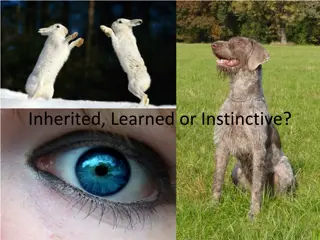Understanding Quantitative and Qualitative Research Methods
Exploring the differences between quantitative and qualitative research methods, this content delves into the importance of qualitative research, various methodologies such as focus groups and interviews, data collection, research ethics, and analysis techniques. It also covers the elements of the r
4 views • 43 slides
Understanding Qualitative Research: Foundations and Orientations
Explore the foundations of qualitative research and orientations to meaning in Big Q qualitative methods. Delve into the values, characteristics, and theoretical underpinnings of qualitative inquiry, and reflect on the significance of meaning-making in research. Consider the role of subjectivity in
0 views • 23 slides
Unraveling the Mystery of Traits and Genes
Explore the fascinating world of traits and genes, understanding how they are passed down from parent to offspring through chromosomes. Delve into the role of genes in controlling various traits such as hair color, eye color, and even unique characteristics like detached earlobes and widow's peak. D
0 views • 11 slides
Understanding the Case Study Method: In-depth Qualitative Analysis
The case study method is a popular form of qualitative analysis involving intensive observation of a social unit. It focuses on detailed analysis of a limited number of events or conditions to understand complex interrelationships. Characteristics include intensive study of a single unit, qualitativ
1 views • 8 slides
Understanding Cultural Traits and Complexes in Society
Culture is a complex whole that encompasses various aspects such as knowledge, beliefs, arts, morals, laws, customs, and more. Cultural traits, at the simplest level, are individual tools, acts, objects, or beliefs related to specific situations or needs, while cultural complexes are groups of inter
0 views • 18 slides
Understanding Inherited, Learned, and Instinctive Traits in Organisms
Traits in organisms can be inherited, learned, or instinctive. Inherited traits are genetic and include characteristics like hair color and disease predispositions. Instinctive traits are inherent behaviors such as sleeping and grooming. Learned traits are behaviors acquired for survival, like house
0 views • 20 slides
Understanding Sex-Linked Inheritance: Key Concepts and Examples
Sex-linked inheritance refers to the transmission of genetic traits determined by genes located on the sex chromosomes. This type of inheritance differs from autosomal inheritance due to the unique characteristics of the X and Y chromosomes. In organisms with XX/XY sex determination, genes on the X
1 views • 21 slides
Exploring Plant Traits: Do Plants Exhibit Variation in Traits?
Discover in this lesson whether plants display variations in traits through the measurement of plant lengths. Students analyze data tables of carrots and leaves to observe trait variations and discuss patterns found in bar graphs and data tables. The focus is on understanding how to identify and int
0 views • 11 slides
Enhancing Natural Experiment Research Through Qualitative Work
Qualitative research plays a crucial role in enhancing natural experiment studies by providing insights into the processes of exposure to interventions, identifying variables influencing exposure likelihood, and determining suitable control groups. Complementary methods within the RE-AIM framework a
0 views • 13 slides
Exploring Leadership Theories: Traits and Behaviors
Leadership theories have evolved from trait theory focusing on personal qualities to behavioral theories emphasizing actions and interactions. While early research sought universal traits for leadership, it encountered challenges due to varied traits among leaders and non-leaders. Behavioral theorie
2 views • 29 slides
Qualitative Data Analysis Techniques in Research
The purpose of data analysis is to organize, structure, and derive meaning from research data. Qualitative analysis involves insight, creativity, and hard work. Researchers play a crucial role as instruments for data analysis, exploring and reflecting on interview discussions. Steps include transcri
1 views • 27 slides
Using Qualitative Methods in Quality Improvement Projects
Qualitative methods offer valuable insights in quality improvement projects by capturing non-numerical information like experiences, thoughts, and perspectives. They help to understand patient and staff perspectives, challenges, and successes in QI initiatives. Utilizing techniques such as interview
1 views • 21 slides
Understanding Experiential vs. Critical Qualitative Research
Delve into the foundations of qualitative research with a focus on experiential and critical approaches. Explore key concepts, defining characteristics, and theoretical foundations, distinguishing between qualitative and quantitative research. Reflect on different orientations, subjectivity, and ref
0 views • 16 slides
Exploring Key Characteristics of Qualitative Research in Psychology
The lecture series delves into the values, characteristics, and theoretical foundations of qualitative research, emphasizing the differences from quantitative methods. It explores experiential and critical qualitative camps, subjectivity, reflexivity, and ontological and epistemological foundations.
4 views • 18 slides
Ensuring Trustworthiness in Qualitative Research Studies
Trustworthiness in qualitative research is essential for establishing confidence in the study outcomes. Guba's four criteria - credibility, transferability, dependability, and confirmability - provide a framework for achieving trustworthiness. Strategies such as adopting reliable research methods, u
3 views • 10 slides
Understanding NVivo: A Brief Introduction to Qualitative Data Analysis Software
Explore the world of NVivo with Dr. Will Fassbender, an Assistant Professor at Montana State University. Gain insights into qualitative data analysis, download procedures, basic functions, and more. Join this introductory session to discover how NVivo can streamline your research process and aid in
0 views • 16 slides
Contrasting Qualitative and Quantitative Traits in Genetics
Genetic traits in organisms can be qualitative or quantitative, with qualitative traits controlled by single genes and showing distinct variations, while quantitative traits are influenced by multiple genes and environmental factors, resulting in continuous variations. Qualitative genetics focuses o
0 views • 13 slides
Understanding Personality Traits and Assessments
Psychologists utilize traits to describe personality, addressing common misunderstandings about introversion and exploring the strengths and weaknesses of personality inventories. The consistency of personality traits over time and across situations is examined, along with the identification of insi
0 views • 38 slides
Explore the Science of Natural Selection and Traits
Dive into the fascinating world of natural selection and traits with a focus on how organisms adapt to their environments. Learn about the importance of Charles Darwin's theories, the role of traits influenced by genes and the environment, and how natural selection drives the survival of the fittest
4 views • 13 slides
Qualitative Analysis of Aldehydes and Ketones in Chemistry Lab
In this Chemistry 318 lab, students will conduct qualitative analysis of aldehydes and ketones using chemical and spectroscopic methods. The lab includes classification tests, spectroscopy (IR, 1H-NMR/13C-NMR, MS), and identification of unknown compounds. Experimental procedures involve physical eva
1 views • 11 slides
Understanding Acquired Traits and Learned Behaviors in Living Organisms
Acquired traits are physical characteristics acquired during a living thing's lifetime, such as scars, and are not passed down from parents. Many acquired traits are also learned behaviors, like reading or flying, which animals develop after birth. Learned behaviors, unlike inherited instincts, are
5 views • 15 slides
Understanding Quantitative Genetics Principles in Animal Breeding
Quantitative genetics focuses on the inheritance of characteristics based on degree rather than kind, compared to qualitative genetics. It involves polygenes controlling quantitative traits, which exhibit continuous variation and can be measured using metric units. Qualitative traits, on the other h
0 views • 22 slides
Tandem Method in Animal Breeding: Sequential Traits Selection
Tandem method in animal breeding involves selecting useful traits sequentially to improve genetic performance. Breeders focus on one trait until a desired level is achieved before moving on to the next trait. While effective in targeted improvement, the method can lead to loss of previously improved
0 views • 6 slides
Understanding Qualitative Methodology: An Overview
This presentation delves into the realm of qualitative methodology, exploring its purpose, characteristics, approaches, data collection methods, analysis, and learning outcomes. It aims to provide a deep understanding of how qualitative research illuminates voices and experiences, distinguishes betw
0 views • 41 slides
Qualitative Approaches in a Data-Intensive World
Qualitative research involves studying perceptions, experiences, and behaviors through verbal or visual expressions. In a data-intensive world, online communication plays a crucial role in data collection. Qualitative eResearch utilizes Information and Communication Technologies (ICTs) strategically
0 views • 10 slides
Meaning and Meaning-making in Big Q Qualitative Research
Qualitative research explores different understandings of meaning and meaning-making, providing researchers with tools, techniques, and values. Big Q qualitative research focuses on the active role of words in creating meaning beyond reflecting experiences. This lecture series delves into the founda
1 views • 20 slides
Exploring Ancestry and Traits Through SNPedia and PCA Analysis
Delve into the world of genetics and ancestry analysis through SNPedia, a comprehensive resource for Single Nucleotide Polymorphisms (SNPs) information. Discover how Principle Component Analysis (PCA) simplifies genetic data to reveal insights into ancestry, traits, and informative SNPs. Explore exa
0 views • 33 slides
Analyzing Qualitative Data: Steps and Coding Methods
Understanding qualitative data analysis involves several key steps, such as preparing the data through transcription, developing codes and categories using content analysis, revising categories based on the data, and reporting the analysis results. Content analysis helps in identifying words, themes
0 views • 32 slides
Design Philosophy for Increasing Accessibility in Qualitative Data Analysis Software
Growing interest in qualitative research methods has led to increased use of Qualitative Data Analysis Software (QDAS). However, challenges remain in making these tools accessible and easy to use, especially in educational settings. This article explores design philosophies to enhance accessibility
0 views • 16 slides
Analyzing U.S. Higher Education Success Metrics: A Qualitative Perspective
Delve into the nuances of U.S. higher education success metrics through a qualitative analysis, exploring the classification of qualitative successes in quantitative datasets and the factors influencing accurate or inaccurate classifications. The study involves individuals who attended community col
0 views • 18 slides
Perceived Risks and Risks Mitigation Practices in Informal Waste Workers: A Qualitative Study
A qualitative study conducted in Kathmandu Valley exploring the perceived risks and mitigation practices of informal waste workers. The research project, led by Sujata Sapkota, aims to address the occupational and health challenges faced by these workers. The study includes a mix of quantitative and
0 views • 22 slides
Strategies for Collective Qualitative Secondary Analysis Using Combined Datasets
Collective qualitative secondary analysis involves reusing data through a collaborative lens, embracing multiple viewpoints to gain deeper insights. The approach emphasizes the constructed nature of research data and allows for diverse interpretations and engagements. This article discusses the proc
0 views • 15 slides
Understanding Genotype and Phenotype in Hereditary Traits
Exploring simple heredity through predicting and modeling phenotypes of Crazy Creatures, students are tasked with contrasting genotype and phenotype. The Crazy Traits lab data table is essential for recording alleles and genotypes, aiding in determining phenotypes for 14 different traits. By complet
0 views • 4 slides
Understanding Research Methods in Public Health
Exploring the nuances of qualitative and quantitative research methods in the context of public health, this content delves into how each approach offers unique insights and perspectives. It discusses the importance of qualitative research in uncovering underlying factors influencing health, interpr
0 views • 77 slides
Qualitative Approach in Cognitive Interview Data Analysis
Understanding the importance of a qualitative approach in analyzing cognitive interview data is crucial for uncovering patterns and recurring themes. This involves delving deeper into the why behind the responses rather than just naming and classifying data. Using methods like standardised coding sc
0 views • 18 slides
Creative Problem Solving through High-level Qualitative Planning and Reasoning
Explore the world of abstract and high-level qualitative planning through examples like MacGyver's inventive solutions, opening jar tricks, and audience participation in problem-solving. Witness how qualitative reasoning can lead to innovative solutions in various scenarios.
0 views • 15 slides
Understanding Objective Personality Tests and Traits
Explore various objective personality tests and traits, including examples of uni-dimensional traits such as Locus of Control, Type A/B personalities, Tolerance for Ambiguity, Need for Cognition, Bem Sex-Role Inventory, and more. Delve into the concepts introduced by psychologists like Julian Rotter
0 views • 14 slides
Understanding Genetics and Evolution through Traits and Adaptation
Exploring concepts like traits, mutations, adaptations, and genetic changes in organisms to comprehend what makes individuals unique and how species evolve and adapt over time. The content delves into the inheritance of traits, the role of DNA segments, and distinguishing characteristics in living b
0 views • 29 slides
Understanding Qualitative Data in Counseling
Exploring the challenges and strategies in utilizing qualitative data in counseling, this discussion covers topics such as data collection, coding for meaning, and presenting qualitative evidence. The importance of qualitative data in improving counseling programs and student services is highlighted
0 views • 32 slides
Foundations of Qualitative Research: Understanding Methods and Data
Qualitative research involves a mix of different methods drawing on qualitative data, with debates on the need for a sensitive approach for richer appreciation. Understanding qualitative data and context, along with various types of data such as interviews and user-generated content, is essential fo
0 views • 41 slides







































